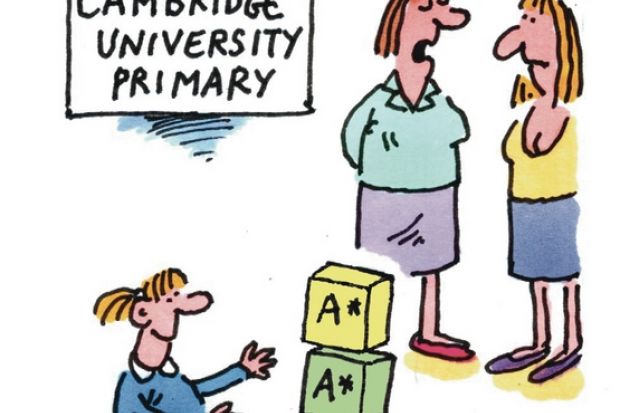Harrods is to offer its staff two-year degrees in sales through a link-up with Anglia Ruskin University. From this month, 10 staff will become Anglia Ruskin students and study modules in human behaviour and psychology on the top floor of the Knightsbridge department store, it was reported on 23 June. Mohamed Al Fayed has sold his stake in Harrods, sadly ending the prospect of his becoming some sort of honorary vice-chancellor.
Labour leadership candidate Ed Miliband will tout his proposals for a graduate tax around campuses in the coming weeks. Writing on 26 June, he argues that "a levy, which would abolish fees but ask graduates to pay between 0.25 per cent and 2 per cent of their income over a 20-year period, could raise substantially more ... than the current system". Mr Miliband, whose father Ralph was an academic, says he will consult students and vice-chancellors about the proposals. The latter group may ask how many years it would take for a graduate tax to produce any extra funds. (See THE news: Pledge to fully fund 10,000 places falls by the wayside)
The University of Cambridge aims to set up its own primary school, creating what The Daily Telegraph believes would be "one of the most sought-after primaries in the country". The newspaper reported on June that Cambridge will compete with other bidders to establish the school on a local housing development, with its teacher-training department involved in running the facility. But critics warned that such a school could widen Cambridge's ancient town-gown divide. "It would not be able to resist offering places to (the children of) university lecturers - we could end up with a selective catchment," said Tom Woodcock, spokesman for the National Union of Teachers' Cambridgeshire branch.
Postgraduates who teach could come under fire thanks to the coalition government's "student charters". Under the initiative, universities would have to make commitments about the number of teaching hours undergraduates receive, it was reported on June. Institutions could also be "required to specify maximum class sizes and whether academic staff do the teaching or leave it to postgraduate students", The Sunday Times said. Postgraduates starting their academic careers may resent not only the implication that professors whose undergraduate days are long behind them necessarily make the best teachers, but also the blow to a valuable income source.
University students should waste less time on the troublesome pursuit of free enquiry, Sarah Palin believes. The former Republican vice-presidential candidate ticked off students at California State University, Stanislaus who dug into a rubbish bin to expose her requirements for speaking at their institution, including first-class air travel or a private jet from her home state of Alaska. "Students who spent their valuable, precious time diving through dumpsters before this event in order to silence someone ... what a wasted resource," Ms Palin said when she fulfilled the engagement, the Associated Press reported on June. She appears not to hold the academy in high esteem: she once scornfully referred to Barack Obama as a "professor of law standing at the lectern".
The leader of the University and College Union has been bracketed with union bosses who receive "10 per cent pay rises and an array of perks". Sally Hunt, UCU general secretary, saw her pay rise from £116,649 to £123,894 in 2008-09, it was reported on June in an article on union leaders' pay.
University museums have been awarded £10.5 million in recognition of the academy's costs in spreading knowledge to the wider public. The Higher Education Funding Council for England announced funding for 22 individual museums in 19 universities and colleges for 2010-11. The 1 July announcement was made following a review led by Sir Muir Russell, former University of Glasgow principal. Traditional institutions were the big winners: £3.36 million went to the University of Oxford, £2.07 million to the University of Manchester and £1.96 million to the University of Cambridge.
Register to continue
Why register?
- Registration is free and only takes a moment
- Once registered, you can read 3 articles a month
- Sign up for our newsletter
Subscribe
Or subscribe for unlimited access to:
- Unlimited access to news, views, insights & reviews
- Digital editions
- Digital access to THE’s university and college rankings analysis
Already registered or a current subscriber? Login
